Dialogue Deliberation for Academic Libraries
Libraries Transforming Communities: Introduction to Dialogue & Deliberation for Academic Libraries
Digital Literacy for St. Cloud State University
Libraries Transforming Communities: Introduction to Dialogue & Deliberation for Academic Libraries
http://www.apastyle.org/learn/
if Allport’s work is cited in Nicholson and you did not read Allport’s work, list the Nicholson reference in the reference list. In the text, use the following citation:
http://www.educatorstechnology.com/2017/08/this-is-how-to-cite-online-sources-in.html

Allport’s diary (as cited in Nicholson, 2003).
+++++++++++++++
more on proofreading in this IMS blog
https://blog.stcloudstate.edu/ims?s=proofreading
https://s3.amazonaws.com/files.cnas.org/documents/CNASReport-LeveragingHistory-final.pdf
Britain
Colonial interests compelled Great Britain to build a complex economic system that funneled resources and wealth to the home islands. Great Britain’s time as the central organizing great power came to a rapid end, with the United States filling that central role.
the United States can no longer uphold all its commitments to international laws and norms. Gaps in attention to historical American commitments have opened the door for competitor nations, including China, to challenge U.S. leadership at the margins.
p. 17 Does China have a strategic plan to replace the United States as the leader of the world? Some voices suggest that it does; however, it is important to note that they do not suggest that it is modeling its ascent upon the United States’ rise a century ago
++++++++++++++
more on history in this IMS blog
https://blog.stcloudstate.edu/ims?s=history
Information literacy: An exploration
https://www.academia.edu/33257496/Information_literacy_An_exploration
My notes: this is a 1997 article
the explosion of information is not accompanied by understanding of information.
p. 337 However, if one accepts a definition of information as a process rather than as a thing, then such policies can at best form a framework for the creation of mean- ing by the individuals or groups who are creating information by bring- ing their knowledge to bear on the data available to them
Data acquisition, maintenance and delivery are a vital part of organisational life, but problems arise when we fail to recognise the necessary links to knowledge.
p. 338 However, just teaching users the practi- calities of applications has been seen to be deficient. It leads to an exces- sive focus on ‘how’ to use a particular application rather than on ‘why’ it should be used 13.
p. 379 Information literacy is a stage above computer literacy, the latter usually implying the ability to use a personal computer . My note: some librarians assume that “computer literacy” is the same as “digital literacy” and were trying to convince me that information literacy is succeeding digital literacy, where it is the other way around
p. 380 There are those within the LIS community who warn that librar- ians should not stray into areas that are not appropriate. Behrens points out that the future is likely to see an increased emphasis on a part- nership between librarians and educators. My note another glaring discrepancy between myself and the librarians at SCSU
p. 386 The phrase information literacy has some value in expressing what might need to be done if the aims of information policies are to be made concrete. It points to the need for an emphasis on the awareness of the individual using data of a range of issues. These are not, it has been argued, to be limited to issues of storage and retrieval but have, centrally, to be concerned with issues of definition and meaning. These issues might be tackled in this order: what are the issues in this field surround- ing the nature of knowledge (i.e. how do we formulate questions); how might data be best acquired, stored, etc. in order to answer these ques- tions? (this might well best be paralleled by training in computer literacy); and what factors, both social and individual, place constraints on our ability to use the data?
+++++++++++++++++++++
more on information literacy in this IMS blog
https://blog.stcloudstate.edu/ims?s=information+literacy
The top 10 workforce skills of 2020 include:
1. Sense making: The ability to determine the deeper meaning or significance of what is being expressed. The Drivers: Rise of smart machines and systems
2. Social intelligence: The ability to connect to others in a deep and direct way, to sense and stimulate reactions and desired interactions. The Drivers: Rise of smart machines and systems, globally connected world
3. Novel and adaptive thinking: Proficiency at thinking and coming up with solutions and responses beyond that which is rote or rule-based. The Drivers: Rise of smart machines and systems, globally connected world
4. Cross cultural competency: The ability to operate in different cultural settings. The Drivers: Superstructured organizations, globally connected world
5. Computational thinking: The ability to translate vast amounts of data into abstract concepts and to understand data based reasoning. The Drivers: New media ecology, computational world
6. New media literacy: The ability to critically assess and develop content that uses new media forms, and to leverage these media for persuasive communication. The Drivers: Extreme longevity, new media ecology, Superstructured organizations
7. Transdisciplinary: Literacy in and ability to understand concepts across multiple disciplines. The Drivers: Extreme longevity, computational world
8. Design mindset: The ability to represent and develop tasks and work processes for desired outcomes. The Drivers: Superstructured organizations, computational world
9. Cognitive load management: The ability to discriminate and filter information for importance, and to understand how to maximize cognitive functions. The Drivers: Superstructured organizations, computational world, new media ecology
10. Virtual collaboration: The ability to work productively, drive engagement, and demonstrate presence as a member of a virtual team. The Drivers: Superstructured organizations, globally connected world
++++++++++++++++++++
more on skills in this IMS blog
https://blog.stcloudstate.edu/ims?s=skills
Bornett, C. C. (2016). Leseförderung digital genial: WieTablets die Bibliothekspädagogik verändern / Tipps nicht nur für Bilderbuch-Apps. (German). Bub: Forum Bibliothek Und Information, 68(10), 606-608.
Šorgo, A., Bartol, T., Dolničar, D., & Podgornik, B. B. (2017). Attributes of digital natives as predictors of information literacy in higher education. British Journal Of Educational Technology, 48(3), 749-767. doi:10.1111/bjet.12451 http://login.libproxy.stcloudstate.edu/login?qurl=http%3a%2f%2fsearch.ebscohost.com%2flogin.aspx%3fdirect%3dtrue%26db%3dkeh%26AN%3d122273174%26site%3dehost-live%26scope%3dsite
(PDF available through ILL)
Biology, IT faculty Maribor, Slovenia. None of them is a librarian
Correlation and regression analysis based on survey data revealed that the attributes of digital natives are poor predictors of IL. information and communication technologies (ICT) experiences expressed as the sum of the use of different applications do not necessarily contribute to IL; some applications have a positive and some a negative effect; personal ownership of smartphones, portable computers and desktop computers has no direct effect on IL, while ownership of a tablet computer is actually a negative predictor; personal ownership of ICT devices has an impact on ICT experiences and Internet confidence, and, therefore, an indirect impact on IL; and ICT-rich university courses (if not designed to cultivate IL) have only a marginal impact on IL, although they may have some impact on ICT experiences and Internet confidence. The overall conclusion is that digital natives are not necessarily information literate, and that IL should be promoted with hands-on and minds-on courses based on IL standards.
Sharman, A. (2014). Roving Librarian: The Suitability of Tablets in Providing Personalized Help Outside of the Traditional Library. New Review Of Academic Librarianship, 20(2), 185-203. doi:10.1080/13614533.2014.914959
McRae, L. l. (2015). TEACHING IN AN AGE OF UBIQUITOUS COMPUTING: A DECELERATED CURRICULUM. Digital Culture & Education, 7131-145.
http://login.libproxy.stcloudstate.edu/login?qurl=http%3a%2f%2fsearch.ebscohost.com%2flogin.aspx%3fdirect%3dtrue%26db%3dllf%26AN%3d110123216%26site%3dehost-live%26scope%3dsite
+++++++++++++++++
more on mobile devices in the library in this IMS blog
https://blog.stcloudstate.edu/ims?s=mobile+devices+library
Plamen Miltenoff – http://web.stcloudstate.edu/pmiltenoff/faculty/
with Heather Abrahamson, Becker High School Social Studies, 763-261-4501 (Ext. 3507)
9:50-11:15; 11:20-11:45; 12:20-1:20 |
link to this blog entry: https://blog.stcloudstate.edu/ims/2017/05/01/history-becker/
short link – http://bit.ly/histbecker
+++++++++++++++++++++
list of web sites with images for the students’ projects:
https://www.ushmm.org/collections/the-museums-collections/about/photo-archives
http://www.jewishvirtuallibrary.org/holocaust-photographs
https://go.fold3.com/holocaust_records/
https://www.wienerlibrary.co.uk/Photographs
https://www.thoughtco.com/large-collection-of-holocaust-pictures-1779703
http://www.yadvashem.org/yv/en/holocaust/resource_center/item.asp?gate=4-2
http://www.gettyimages.com/photos/cold-war
http://www.coldwar.org/museum/photo_gallery.asp
http://www.cnn.com/2014/03/04/world/gallery/cold-war-history/
http://time.com/3879870/berlin-wall-photos-early-days-cold-war-symbol/
http://digitalarchive.wilsoncenter.org/theme/cold-war-history
http://archive.millercenter.org/academic/dgs/primaryresources/cold_war
http://www.gettyimages.com/editorialimages/archival
https://www.archives.gov/research/alic/reference/photography.html
+++++++++++++++++++++
Defining my interests. Narrowing a topic. How do I collect information? How do I search for information?
| How do we search for “serious” information? | |
|
|
|
|
https://www.google.com/; https://scholar.google.com/ (3 min); http://academic.research.microsoft.com/; http://www.dialog.com/; http://www.quetzal-search.info; http://www.arXiv.org; http://www.journalogy.com/ |
|
http://digg.com/, https://www.reddit.com/, https://www.quora.com/ StackExchange http://stackexchange.com/Kngine.com; AskScience https://www.reddit.com/r/askscience/, , and similar, https://medium.com/ (5 min) |
| YouTube, SlideShare https://www.slideshare.net/ and similar | https://www.slideshare.net/search/slideshow?searchfrom=header&q=modern+history |
|
(10 min) |
| Wikipedia | https://en.wikipedia.org/wiki/Modern_history |
| blogs, listservs | http://www.bestcollegesonline.com/blog/100-awesome-blogs-for-history-junkies/ |
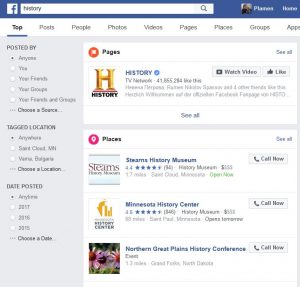 |
|
 |
|
| LinkedIn Groups https://www.linkedin.com/groups/my-groups | 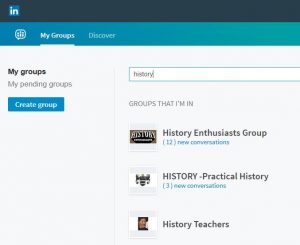 |
| team work | using your social media accounts (e.g. Facebook, Twitter), search for information related to your topic of interest (5 min) |
|
|
|
|
https://www.semanticscholar.org/ |
|
(20 min) |
| every university library has subject guides for different disciplines. here are the ones from SCSU http://stcloud.lib.mnscu.edu/subjects/guide.php?subject=HIST-WOR | Kahoot game (5 min) |
| basic electronic (library) search information and strategies. Library research services (5 min)
using the library database, do a search on a topic of your interest. compare the returns on your search. make an attempt to refine the search. retrieve the following information about the book of interest: is it relevant to your topic (check the subjects); is it timely (check the published date); is it available |
 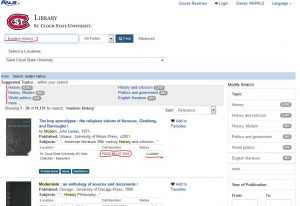 |
| Strategies for conducting advanced searches (setting up filters and search criteria) | |
| Articles and databases (10 min) | 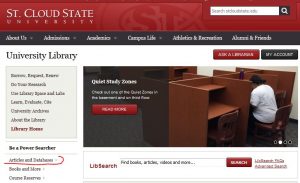    |
| Kahoot competition | use your smart phones to find the best researcher among you https://play.kahoot.it/#/k/c376c27a-d39a-4825-8541-1c1ae728e1bc https://play.kahoot.it/#/k/5e6d126f-be4d-47d0-9b6e-dfc3f2c90e61 https://play.kahoot.it/#/k/89706729-3663-4ec3-a351-173bf1bf4ed7history: https://play.kahoot.it/#/k/7510e6d8-170f-4c0c-b7bd-6d7dd60c3f6e |
| Reference and Facts | |
| Streaming and Video | http://www.stcloudstate.edu/library/research/video.aspx |
| Journal Title and Citation Finder | |
| shall more info be needed and or “proper” session with a reference librarian be requested | http://stcloud.lib.mnscu.edu/subjects/guide.php?subject=EDAD-D |
| Institutional Repository | http://repository.stcloudstate.edu/ |
|
|
| Academic.com and ResearchGate | |
|
|
|
|
http://bit.ly/360lib and http://bit.ly/360lib2; http://bit.ly/VRlib (15 min) |
|
|
|
|
|
| Refworks | https://www.refworks.com/refworks2/default.aspx?r=authentication::init& |
| Zotero, Mendeley, Endnote | |
| Fast and easy bibliographic tools: | https://blog.stcloudstate.edu/ims/2013/12/06/bibliographic-tools-fast-and-easy/ |
| Primary and secondary sources video | |
++++++++++++++++++
more on history in this IMS blog
https://blog.stcloudstate.edu/ims?s=history
From 1991 to 2010, the middle class expands in France, the Netherlands and the United Kingdom, but, as in the United States, shrinks in Germany, Italy and Spain
http://www.pewglobal.org/2017/04/24/middle-class-fortunes-in-western-europe/
The size and the well-being of the middle class are intertwined with some of the key economic challenges facing the developed world this century – income inequality is rising in many countries, economic growth is anemic, and economic mobility is lesser than in the past.
A smaller middle class or a relatively less well-off middle class often reflects a more unequal income distribution. In turn, increases in income inequality present an adverse climate for economic growth. A relative decline in the incomes of lower- and middle-income families may create a drag on overall consumption in the economy, lead to excessive borrowing by these families, or provide disincentives to invest in education.
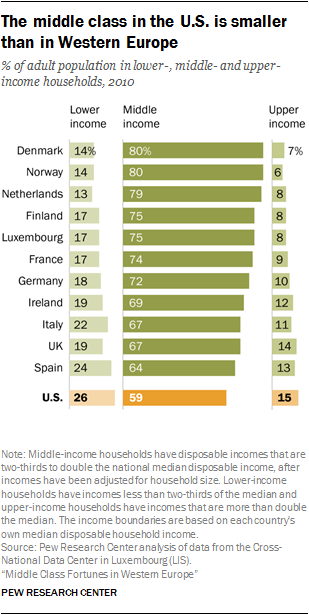
A more vibrant middle class may also improve the economic outlook for future generations. In the U.S., for example, communities with larger middle classes offer a greater likelihood that children will experience upward mobility relative to their parents’ status in the income distribution. A similar relationship has also been found to exist across countries, whereby intergenerational mobility is greater in countries with less income inequality.
Many countries in Western Europe have significantly larger middle classes than the U.S.
The U.S. has larger lower- and upper-income tiers than the selected countries from Western Europe
Income inequality is related to the size of the middle class in a country
https://theculturetrip.com/europe/articles/this-literature-map-of-the-world-shows-you-every-countrys-favourite-book/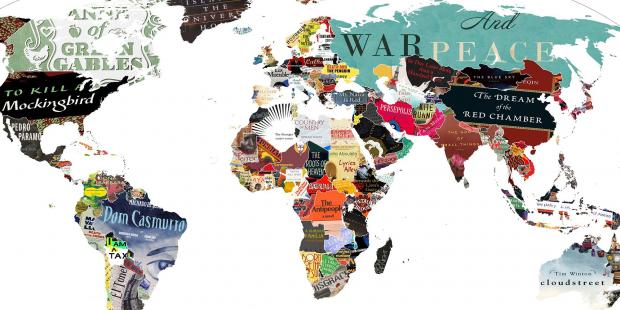
Following are the SCSU library locations:
USA – To kill a mockingbird – PS3562.E353 T6x
Russia – War and Peace – AC1 .G72 v.51
Canada – Anne of Green Gables – PR6025.O45 A5 1994x
United Kingdom – Pride and Prejudice – PR4034 .P7 1991b online at http://www.pemberley.com/janeinfo/pridprej.html
Spain – Shadow in the Wind – PQ6668.U49 S6613 2004
Iran – Persepolis – PN6747.S245 P4713
Ireland – Ulysses – PR6019.O9 U4 1998
Bulgaria – Under the Yoke – PG1037.V3 U5x
China – Dream of the Red Chamber – PL2998.T745 D7 1958cx
Congo – The antipeople – PQ3989.2.S64 A813 1988
What do you think should be your country’s favorite book?
Texas A&M virtual tour
http://vr.concept3d.com/texas_am/
Texas A&M last month debuted its VR tour at the SXSWedu conference in Austin, using headsets. Anyone can view the tour on desktop or mobile devices.
++++++++++++++++
more on VR in this IMS blog
https://blog.stcloudstate.edu/ims?s=virtual+reality